Greg Martin is sharply aware of his own shortcomings, but also feels convinced a grave injustice has occurred. ‘I’ve always been a big personality,’ he says. ‘I’ve always said what I felt. I’ve been a bit of a womaniser. I’ve been called the “wayward son”.
‘But I was devastated, when our father died, that my sister and I were treated not like the much-loved children we were, but more like the illegitimate offspring of a Victorian chambermaid.’
It is a graphic analogy but it sums up exactly how he and his older sister Alexis were relegated to second-class siblings; sidelined in favour of their younger half-brother and sister Giles and Lucie, and virtually obliterated from their father, Sir George Martin’s, will.
According to Greg, 68, this banishment began long before Sir George – the music producer widely known as the ‘fifth Beatle’ due to his highly acclaimed, long-lived collaboration with the most influential rock band in history – died nine years ago, aged 90.
Greg, a Royal Academy of the Dramatic Arts-trained actor and writer, who starred alongside Richard Burton and Liam Neeson in the US mini-series Ellis Island, was once tipped to be the next James Bond and it was his imposing stature and striking looks that endeared him to a string of glamorous women.
He had brief liaisons with Madonna and Sharon Stone, and a short-lived engagement to the late socialite Tara Palmer-Tomkinson who called him a ‘cad’.
But long before his notoriety as a lothario earned him an invidious reputation, both he and his sister were being ostracised.
In fact, Greg says their ousting began in 1966, when his father divorced their mother Sheena and married for the second time. Greg was just nine years old.
Greg believes his ‘controlling’ stepmother Judy set out to install her own son and daughter as the favoured children – and succeeded.
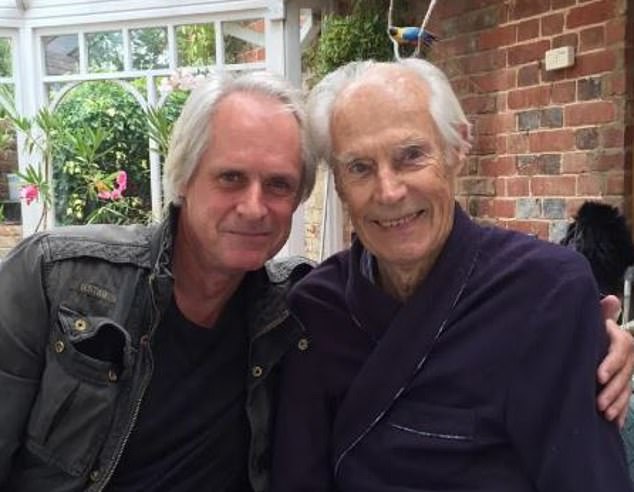
Greg and Sir George Martin on Father’s Day in 2015, one year before Sir George died. Greg says he was ostracized from the family when his father remarried
‘Judy hated me from the word go,’ he says of his late stepmother, who died in 2023. ‘I remember feeling that I was in the presence of someone very dark. She was frosty and cold with me and Dad was very different when he was with her. She was very controlling.
‘Many years later one of my father’s colleagues said to me, “Why does your father let that b**** of a wife drag your dad around on a f***ing chain?”
‘But even as a child I used to say to my mum, “Daddy is no fun when Judy is around”. In fact, she was a monster. It felt like she was determined to get rid of me so Giles could be the heir to the throne.’
This assertion was, it seems, borne out when Sir George died in 2016. A man celebrated for his kindness, urbanity and wit, as well as for his prodigious musical talent, he is often remembered as the world’s most famous record producer – an illustrious career that made him a very wealthy man.
Yet he left nothing at all in his will to Greg, while Alexis was categorised among her father’s loyal employees – a chauffeur and a secretary – and allocated a ‘pittance’ of around £68,000.
That Sir George left a mere £1million – when his fortune was estimated at upwards of £250million – is doubtless a tribute to his tax advisers who, it seems, sheltered his vast wealth. But today Greg offers an explanation – as tantalising as it is extraordinary – that he feels might solve the mystery of the inequities in his adored father’s will.
Greg, who bears a striking physical resemblance to his father, alleges that Giles may be benefiting from a legacy that could actually be his. He is considering taking legal action against his younger half-sibling, because he believes that Giles may be using a house, possibly in central London, and accruing interest on a substantial legacy – currently lodged in a US bank account – that Sir George actually intended for Greg.
Why does he make this revelation now, almost a decade after his father’s death?
Greg contends that a close family friend disclosed, ‘out of the blue’, only last month, that she was harbouring a ‘huge burden of guilt’.
‘She told me my father had confided in her that he was leaving me a property and a large sum of money – I believe around £3.5 million – currently in a US bank account.
‘He had written me a letter about it and asked her to give it to me. But she said my stepmother intercepted the letter and burnt it. So I have no proof of Dad’s intention other than this family friend’s word. She is my sole witness.’
Tantalisingly, he also says that a psychic who works for the FBI in America – whom he encountered while researching his latest thriller – told him that a ‘substantial’ property and some money that was rightfully his had been misappropriated.
There is no evidence that Giles knew about any letter or the interception of it.
All this might seem fanciful, were it not for the body of evidence that seems to substantiate his claims that his stepmother wanted to obliterate him from his father’s life.
He tells me that his ‘kind and gentlemanly’ dad became ‘absolutely besotted’ by his second wife and he details a series of snubs and affronts that appear to have been orchestrated by Judy. Greg and Alexis did not feature on the VIP guest list when their father staged a charity concert at the Royal Albert Hall in 1997; they were not invited to his retirement party in 1998 nor were they included when he was honoured with a Lifetime Achievement Award at the Grammys in 2008.
Their names were even expunged from invitations to the memorial service when Sir George died; indeed even Sir Paul McCartney’s public message of condolence failed to mention the children from his first marriage. After Sir George’s death, the froideur became practically glacial.
Greg, who has been married and divorced three times, is now single and – favouring an itinerant lifestyle – currently living alone in Paris. He has a son, Connor, 32, from his second marriage.
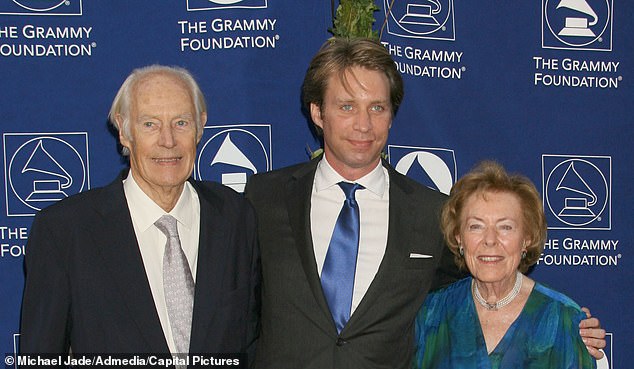
Sir George, his second wife Judy and son Giles at the Grammy Foundation benefit
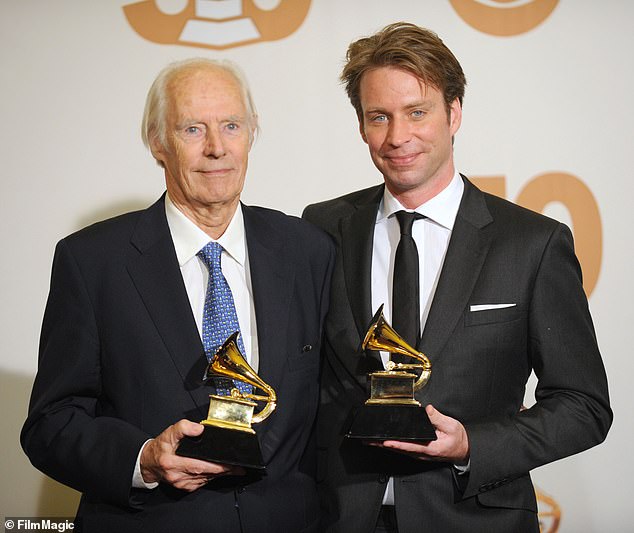
Greg and Alexis were not included when their father was honoured with a Lifetime Achievement Award at the Grammys in 2008 – but younger brother Giles (pictured) was
Certainly, Greg has inherited his father’s stature – he is a towering 6ft 3in tall – and his rich baritone voice oscillates between a transatlantic drawl (he has spent much of his adult life in the States) and the English enunciation of a public school boy: he won a scholarship to the independent St Albans School in Hertfordshire. He attributes his talent for mimicry and unerring ear for accents to his RADA training.
He was also, during a ‘mid-life crisis’, an inveterate philanderer.
But it was his relationship with his stepmother Judy that had the biggest impact on his life.
He begins the story of how she usurped his beloved mother Sheena at its start, in his childhood.
Sheena, a singer, was also Greg’s primary school music teacher, and when his father left her for Judy – his secretary at Parlophone records – in 1962, Greg felt her grief acutely. ‘I was five and I couldn’t understand what was going on, but I knew Mum was terribly in love with Dad,’ he says. ‘At the start Mum told me, “Daddy’s living in London”, and I was convinced they were still together and that he would come back.’
It was not until he was nine that his mother told him and Alexis, then 12, that they were actually divorcing. ‘I cried for hours and hours. I remember saying, “I’ll marry you, Mummy”, because she was heartbroken.’
Sir George’s divorce – a scandal at the time – coincided with a meteoric rise in his fortunes.
Having left the modest family semi in Hatfield, Hertfordshire, he and Judy swiftly acquired grander properties; a handsome four-storey townhouse in Paddington and The Old Rectory in Coleshill, Wiltshire.
When Dad came to see us he arrived in a Rolls-Royce,’ says Greg. ‘Judy was in the front seat. She would never let him see me on my own. She made it difficult for us to communicate. She was always the one who answered the phone. Her control was absolute.’
When a postcard arrived from their father telling Alexis (then 13) she and Greg were to have a baby sister (Lucie), the addendum perplexed them. ‘Dad wrote, “Exclusivity is demanded”,’ he recalls.
What did that mean? I ask.
‘I took it to mean that Judy had told him her children would come first.’
Greg and Alexis – nicknamed Pog and Bundy – nonetheless went once a month during their childhood to visit their dad and Judy in Wiltshire. Judy was a fine cook, and they played happily with their siblings. But Greg was conscious that Judy kept tight control of the purse strings. ‘At Christmas, Dad would give my sister and me a cheque for £500 each and say, “Don’t tell Judy.”
‘When I was 24, an actor living in New York, Dad was there visiting. He invited me over and said, “I want to give you some money.”
‘I protested and said I was quite okay. But he insisted. He was trying to put some money in my hand when Judy opened the door and he hid it.
‘I felt shame and confusion.’

A portrait of Sir George taken in 1960
There were other gifts of money when Greg was financially hard-pressed, all given with the proviso: ‘Don’t tell Judy.’
What mystifies him is the extent of her hold over him.
‘Nobody had a bad word to say about Dad. He was kind, gentlemanly; very funny – dry- and quick-witted – but he could be stern, which he was with The Beatles sometimes.
‘And the extraordinary thing was, he thought Judy walked on water. I think she put a spell on him.’ He recounts many significant occasions when he and Alexis were excluded from their father’s life.
When in 1997 Sir George organised a benefit concert at the Royal Albert Hall to help rebuild the Caribbean island of Monserrat after a devastating volcanic eruption, rock’s royalty – among them Sir Paul, Phil Collins, Sting, Sir Elton John and Eric Clapton – all performed.
Giles helped to organise it. Judy and Lucy were given seats in the Royal Box.
‘I rang to see if Alexis and I could have tickets, too,’ says Greg. ‘Judy answered and we were grudgingly given one ticket each – not very good ones.
‘After, an executive told us there was a party at the Hard Rock Cafe on Hyde Park Corner. Dad was delighted to see us, but Judy asked, “How on earth did you two get in?”’
Shortly after, Greg proffered an olive branch. ‘I called the house and asked Judy, “Can I take you and Dad out to dinner on Monday?” She said, “Sorry, we’re busy.”
‘On the Tuesday a business colleague asked me, “How was your Dad’s retirement party?” I blushed and spilled my wine. I hadn’t even known about the party – but I learned it was on the very evening I’d invited them out to dinner – and of course Alexis and I weren’t on the guest list.’
While ‘deeply hurt’ by these snubs, Greg ‘never doubted’ his father’s love.
He says, too, that if he ever tried to ask his father to collaborate on creative business ventures – he once wanted him to write a score for a film – his attempts were blocked at every turn.
Towards the end of Sir George’s life, Greg claims he was reduced to seeking appointments to see his father through his manager.
The last time they had supper together was in 2011 at L’Ermitage Hotel in Beverly Hills: ‘Dad was there with Judy, Giles and Lucie. He’d been honoured with a Lifetime Achievement Award at the Grammys and I’d not been invited. He was smart and wise and funny, but there was so much emotion bottled in. At the end, I gave him a kiss and told him I loved him. He told me he loved me too. Then I got into my car and just started to cry. I couldn’t stop.’
In 2015 Greg was living, once again, in England and he decided on impulse to visit his dad on Father’s Day at his home in Wiltshire.
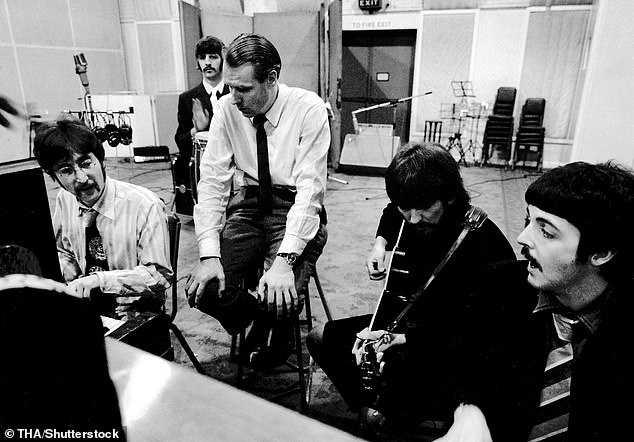
The Beatles and Sir George at Abbey Road Studios during a recording session for Sgt. Pepper’s Lonely Hearts Club Band in 1967
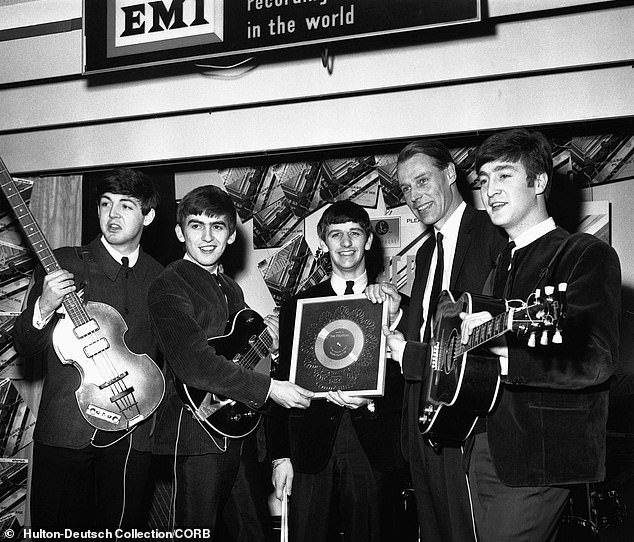
The Beatles and Sir George after they were awarded a silver disc for selling a quarter of a million copies of the single Please Please Me
By then Sir George was ailing: ‘He had cancer and prostate problems, but he had this British pretence that everything was fine.’
‘That was the last time I saw Dad. He was in his pyjamas. We hugged and kissed, and he waved me goodbye, looking down the drive.’
On March 8, 2016, Sir George Martin died in his sleep. Greg was informed by Giles who sent an email, expressing how sorry he was ‘for all of us’ and letting Greg know that a small funeral would be held promptly, the next week, before a bigger memorial service.
On the morning of the funeral – held at a little church a stone’s throw from The Old Rectory – the mourners gathered for the short walk to the service.
‘I’d bought some lilies and had a little eulogy in my pocket. I assumed I might be invited to say my piece. Judy, Lucie and Giles were sitting at the front of the church, I was told to sit at the back. Then, one by one, my entire family – even Alexis – got up and spoke about Dad. I wasn’t asked to say a word. I felt bloody awful.
‘It was a ritual humiliation.’
The wake added to his sense that he and Alexis had been excluded. Neither did he feel his father was appropriately honoured.
‘We heard the rumbling of the Rolls Royce engine. It was Dad’s car – the one he’d come to pick us up in, in 1966 – rolling down the hill to the reception with Judy, Lucie and Giles in the back.
‘Alexis and I were like spectators. We walked there.
‘Judy had bought prosecco from Tesco, but Dad had sophisticated tastes. He would have wanted Bollinger and vodka martinis. He’d have been disappointed.’
Greg did not want to go to the much more public memorial, attended by 600 mourners – including Sir Paul, Elton John and John Lennon’s widow, Yoko Ono – at the church of St Martin in the Fields, central London, two months later.
Alexis had expected to be part of it, however. ‘She wasn’t even mentioned on the invitation,’ says Greg. ‘She couldn’t believe it.’
Stung by so many rejections, it came as no surprise to Greg that he did not even rate a mention in his father’s will. It is both poignant and apposite that all he got was the family coat of arms, with its Latin motto Amore Solum Opus Est (All You Need Is Love).
Judy died, aged 95, in October 2023, leaving her assets – aside from a few small bequests – to Lucie and Giles.
Greg bears not a shred of animosity towards his father: ‘I’d schooled myself to expect nothing from Dad’s will because I knew that Judy dominated him and his finances.
‘But I also always knew he was a good man who I believe loved all his four children equally. I feel that he would have wanted us all to have been treated fairly – which is why I intend to fight, through the courts if necessary, for what I believe is rightly mine.’
To contact Greg Martin go to www.gregorypaulmartin.com











